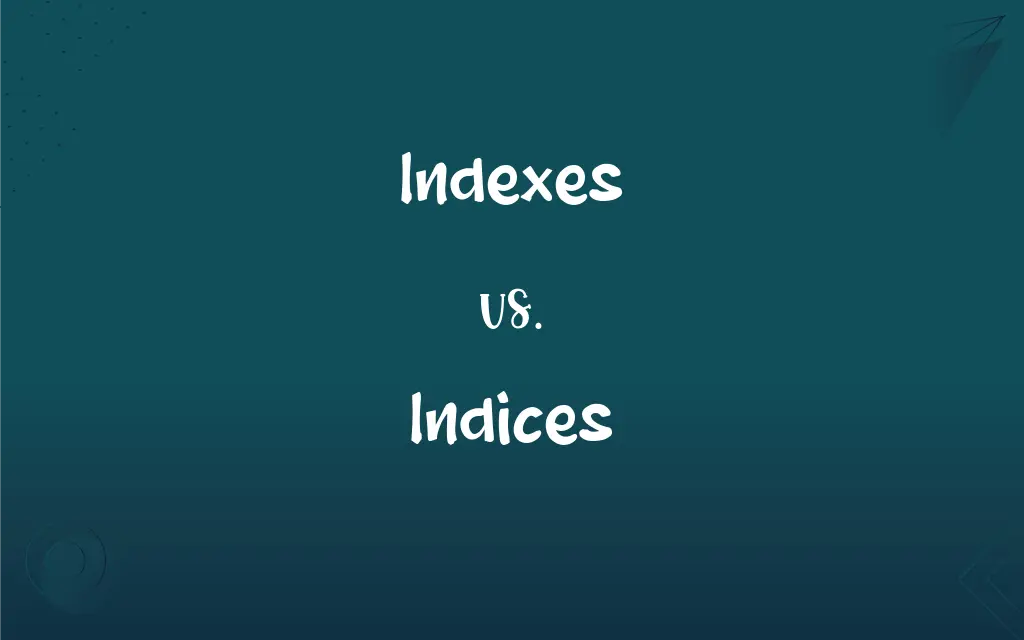Indexes vs. Indices: What's the Difference?
Edited by Janet White || By Harlon Moss || Updated on October 18, 2023
Indexes and indices are both plural forms of "index," but "indexes" is commonly used in general contexts, while "indices" is preferred in mathematical and financial contexts.

Key Differences
Indexes and indices are both plural forms of the word "index." While their root word is the same, the contexts in which they are typically used differ.
Indexes is the more general term and is frequently found in contexts like book listings, databases, and reference works. On the other hand, indices is traditionally used in mathematical, financial, and some scientific contexts.
When speaking of stock market measurements or mathematical sequences, "indices" is the preferred term. Regardless of these preferences, both terms are grammatically correct, and their usage can sometimes overlap.
In many cases, regional variations can dictate the preference for one over the other, though "indexes" is often the more universally accepted term in modern American English. Yet, one should be aware of the nuances of each term to use them in their most appropriate contexts.
Comparison Chart
General Usage
Commonly used in general contexts.
Preferred in mathematical and financial contexts.
ADVERTISEMENT
Etymology
Latin origin.
Latin origin, associated with specific fields.
Example Usage
Book indexes, database indexes.
Stock market indices, mathematical indices.
American English
More universally accepted in modern contexts.
Used in specific disciplines.
Grammatical Correctness
Both are correct plural forms of "index".
Both are correct plural forms of "index".
Indexes and Indices Definitions
Indexes
Alphabetical listings in books.
The book has detailed indexes for easy referencing.
ADVERTISEMENT
Indices
Used in stock markets.
The major stock market indices dropped today.
Indexes
Measurements or indicators.
The happiness indexes of various countries were compared.
Indices
Representations in formulas or expressions.
The tensor's indices dictate its properties.
Indexes
Instruments for showing positions.
The clock's indexes moved steadily forward.
Indices
Plural form of index in mathematics.
The sequence has several indices that are prime numbers.
Indexes
Structures in databases for faster queries.
Database performance improves with well-optimized indexes.
Indices
Exponents in mathematical expressions.
The indices in the equation were raised to the power of 3.
Indexes
Pointers or indicators.
The road signs act as indexes to travelers.
Indices
Listings or enumerations.
The document has several indices of terms for clarity.
Indexes
An alphabetized list of names, places, and subjects treated in a printed work, giving the page or pages on which each item is mentioned.
Indices
A plural of index.
Indexes
A thumb index.
Indices
See Index.
FAQs
Are "indexes" and "indices" interchangeable?
Generally, yes, but it's best to use "indices" in mathematical and financial contexts.
Is "indices" only used in mathematics?
No, it's also used in finance and some scientific contexts.
Which form is more common in American English?
"Indexes" is more universally accepted in modern American English for general contexts.
Can a book have "indices" instead of "indexes"?
Yes, but "indexes" is more commonly used in that context.
Are "indexes" and "indices" pronounced differently?
Yes, "indexes" sounds like "in-deks-ez" and "indices" sounds like "in-dih-sees."
Why are there two plural forms for "index"?
Both come from Latin, but their usage has evolved over time and context.
Is it ever incorrect to use "indexes" instead of "indices"?
Both are grammatically correct, but context matters. For general use, "indexes" is preferred; in specific contexts like math, "indices" is more appropriate.
Which is the correct plural of "index": indexes or indices?
Both are correct, but "indexes" is more general, and "indices" is used in specific contexts like math and finance.
Are database "indices" a thing?
While the term "database indexes" is more common, "database indices" can be encountered, albeit less frequently.
Can I use "indices" in everyday conversation?
Yes, but "indexes" might be more commonly understood in general discussions.
Are there any other words with similar dual plural forms like "index"?
Yes, like "appendix" which has "appendices" and "appendixes."
Are there "website indices"?
The term "website indexes" is more common, but "indices" could be used depending on the context.
Which term do financial experts prefer when discussing the stock market?
They typically use "indices."
Do all English-speaking regions prefer "indexes" in general contexts?
Mostly, but preferences can vary based on regional variations.
What do "stock market indices" refer to?
They refer to measurements or indicators of stock market performance.
If I'm writing a scientific paper, which term should I use?
It depends on the context. If referring to a list, "indexes" is fine. For mathematical references, "indices" is preferred.
Do dictionaries list both plural forms?
Most modern dictionaries list both but might note the specific contexts for "indices."
In programming, which term is more prevalent?
"Indexes" is more commonly used, especially in the context of databases.
Is it wrong to use "indexes" in a mathematical context?
It's not wrong, but "indices" is the traditional and preferred term.
Which form is older: "indexes" or "indices"?
Both have Latin origins, but "indices" has a more specialized historical use in certain fields.
About Author
Written by
Harlon MossHarlon is a seasoned quality moderator and accomplished content writer for Difference Wiki. An alumnus of the prestigious University of California, he earned his degree in Computer Science. Leveraging his academic background, Harlon brings a meticulous and informed perspective to his work, ensuring content accuracy and excellence.
Edited by
Janet WhiteJanet White has been an esteemed writer and blogger for Difference Wiki. Holding a Master's degree in Science and Medical Journalism from the prestigious Boston University, she has consistently demonstrated her expertise and passion for her field. When she's not immersed in her work, Janet relishes her time exercising, delving into a good book, and cherishing moments with friends and family.































































